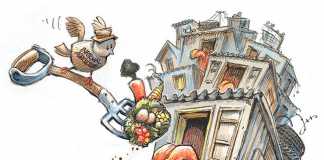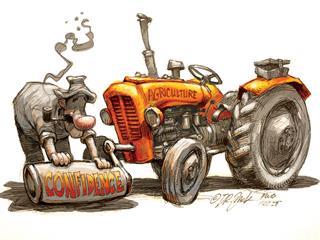The National Development Plan will only ever be as good as its implementation. Right now, it’s missing a spark, some kind of magic to bring it to fruition. Throughout history, most fundamental changes have been initiated by the youth. On our campus, we recently witnessed a new season of activism by the so-called ‘inconvenient youth’.
We thought they were interested in getting a good education in order to get a good job as soon as possible. Yet instead of attending classes, my students were out there agitating for the removal of the infamous Rhodes statue. The new world is not forged by political processes or economic power, but by individuals who get together, decide to do something – and then the process spreads like wildfire. These actions are often without an ideology; they centre, instead, on a specific issue.
The common good
In every society, a battle rages between those in power and those opposing that power. These two forces can end up destroying each other unless they say: Stop, what is in the common interest and where is the common good?
If we want to realise the common good, then we need to harness the spirit of our youth. If we can’t make the NDP work, these inconvenient youths will take it from us and do it themselves.
The role of leadership
My theologian father couldn’t understand why I went into agriculture and tried to teach me something of agriculture from the scriptures. He asked me whether I knew why most great leaders in the scriptures where shepherds and herders. A herder, he explained, learns that when he takes his cattle to the pastures, he needs to walk in front to show them the way. And when they are grazing, he sits and observes them, watching for ‘corrupt behaviour’.
When he returns the animals to the kraal, he now walks at the rear. This shows that you can lead from behind, where you need not be seen but from where you can keep everyone together, united.
Encouraging solid growth
When we compiled the NDP, we looked at the ‘big idea’ in other countries. The one thing we saw clearly was that when
you try to change the nature of industry and society based on the redistribution of assets alone, you will stumble. This doesn’t mean that some sort of redistribution must not happen – it has to be as a form of justice – but it should not be the main purpose.
When looking at the various ways other countries reformed their agricultural industry, we realised that South Africa needs an economic imperative for growing its agricultural sector. For South Africa, this is a labour-intensive expansion of agriculture.
Where do we need to expand? In short, in industries that can show market growth and productivity expansion.
‘Labour-intensive’ does not necessarily mean increasing the number of people working on farms – it is rather about livelihoods. It relates to how people can work for themselves and how the NDP can guide us in distributing those livelihoods. Economic development is going to be driven by market demand and supply chain measures. We’ve seen the livestock revolution sustain its momentum as meat consumption grows with more people moving up the economic chain.
We’ve seen huge product diversification and sophistication in logistics. The real challenge lies in the supply side. I don’t think we’re close to capitalising on the benefits from research and development (R&D), or fully unlocking its advantages. At the moment, it is a piecemeal approach, whereas the various research institutes should be working together so that there is collective momentum.
Then there are the capital providers. Yes, capital has an appetite for agriculture and specifically the red meat industry. But the industry should not simply let market forces dictate where capital should be utilised. Productivity gains are often to be found lower in the agricultural hierarchy among people able to increase production but who don’t necessarily have the capital to finance that productivity expansion.
Finding a way forward
Those factors which are critical to ensuring success for the industry include: buying into the concept of labour-intensive growth; more focus on optimising export opportunities and a more sophisticated approach in this regard; and growth in productivity.
At the same time, the agricultural industry needs to unlock productivity growth among the labour force by compensating at much better levels. This is not only a question of being humane – it is one that makes economic sense.
Furthermore, we cannot continue to depend on the private sector to do all the things that the state is supposed to do. The greatest challenge facing the state is therefore not to amend another plan, but to work at growing its capability. If all of these things can come together, we will have created the ‘magic’ we need to make the NDP work.
Prof Mohammed Karaan holds a PhD in Agricultural Economics from Stellenbosch University. Email him at [email protected]













